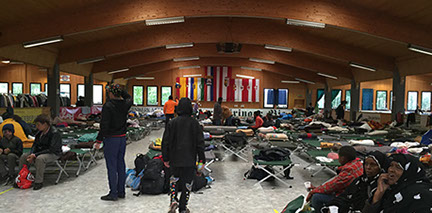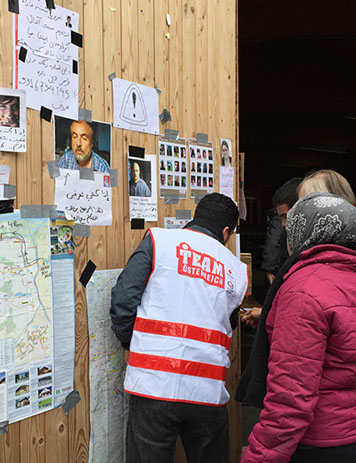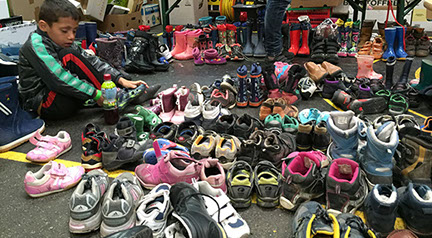Signs of hope
Accommodations are improvised at the Salzburg train station, but the friendly authorities make for an inviting atmosphere.
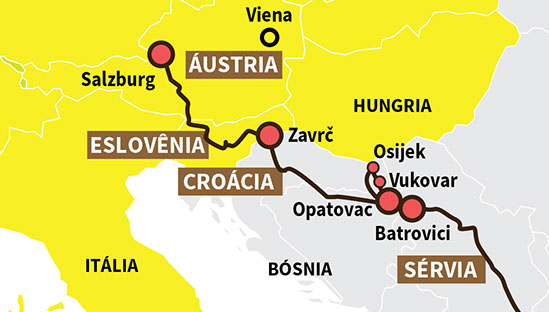
Iarrive in Salzburg at 8 pm on Saturday, September 26. As I get off the train after a three-hour trip, I see hundreds of people camped in the station's lobby. Kids throw balloons up in the air. I imagine Mohammad and Tala should be close. But I can't find them.
I keep sidestepping weary adults' faces looking for familiar features. Finally, I see Mohamed sitting in a circle with Syrians on a blanket covering the cold floor of the station. I ask about the others, and he says they got tired of waiting. Eager to get into Germany, which in Salzburg is separated only by a bridge, they took a taxi to cross the border, though they were stopped by the police on the way. The Iraqi got a message from one of the other men in the group. The last piece of information is that they would be taken back to the station. The only reason why Mohamed is still at the station is because he lost track of the others when he went back to grab his backpack. Now, he sits waiting for them.
"They should be back soon," he says.
Mohamed exibe o par de tênis que ganhou e substituiu o chinelo velho com uma tira arrebentada com que caminhava até então
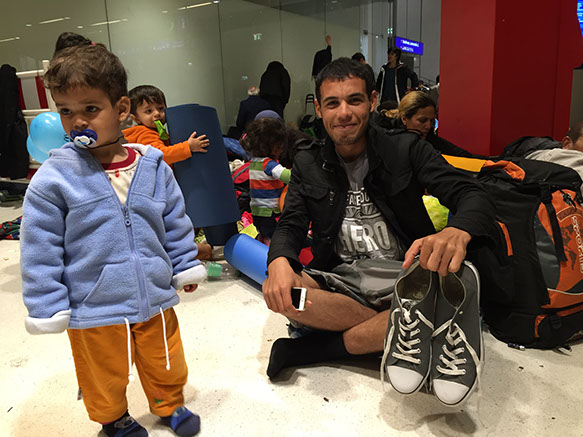
The accommodations are improvised at the station, but the friendly authorities make for a pleasant atmosphere. In the middle of the crowd, a uniformed police officer plays with the children, batting at their balloons. Volunteers distribute food often. Women and children are able to rest in an area set aside. And the covered station also provides shelter against the cold weather.
Mohamed is happy because he got himself a new pair of shoes, which replace his old, worn-out slippers. During our conversation, I learn that the family did not go to Hungary after leaving the Opatovac camp, contrary to what the Croatian police had told me. They were taken on a bus first to Slovenia and then to Austria.
Mohamed tells me they were treated relatively well along the way, with the exception of some shoving by the police and several hours waiting under the rain as they were about to leave Croatia. If they had taken the Hungarian route, their memories would probably be worse, according to what I heard from other Syrian refugees in the Austrian capital.
“It was horrible. They beat us with nightsticks and all the time kept saying, “Fuck you! Fuck you!,” says Muhammad Bakeer, 24, from Syria.
While Mohamed keeps me updated, an Iranian woman stops by, asking for information.
“What time does the train leave?”
Nobody knows the answer. Most of the refugees are already sleeping, tired of waiting.
At 1:40 am, police officers show up, telling the people to wake up. They anticipate the train to Germany, but it turns out to be a simple change of address. The refugees are told that they will be taken "to a better place" inside the station.
Single file, they are taken to a garage with hundreds of cots and blankets, arranged in rows. The room is hung with drawings made by refugee children, courtesy of volunteers. In their illustrations, there are signs of hope for a new life, away from bombs and beheadings: a red flower, dozens of little hearts, children singing, Syrian flags. Hope cannot stop the little ones in the room from crying, an unsettling chorus of restless voices into the night.
Mohamed goes to sleep. He still has no news about the family.
"They should have been here by now," he says, looking worried.
At 7:40 am on Sunday, September 27, the police turn on the lights in the garage. Mohamed asks for information and is told that he must get ready because a bus is coming to transport the refugees. Two hours later, we get in the line to board the bus without knowing its destination.
“My heart is going to jump out of my mouth.” says Iranian Mozhy Barraghi, who's traveling alone and has befriended Mohamed.
The Iraqi tries to contact the family. He manages to call Ammar on WhatsApp, through an available wi-fi network. The Syrian says he is already on the border.
“We're going to meet up, then. We're taking a bus that's going to drop us off there!” Mohamed celebrates.
The trip lasts an hour and a half. After our arrival, a policeman tells us that the German border is a four-kilometer walk. We are in Mühlheim, in northeastern Austria. Before this last walk, refugees stop to have a meal at a reception center that has been set up to welcome migrants.
In the restroom, a young woman cries uncontrollably, showing her bare legs. She says things in a loud voice, things that no one understands, not even the Arab women. A volunteer is called, but she doesn't know how to help her, either. Until Mozhy, the Iranian woman, identifies the language the woman speaks. It's Farsi, the Persian language, which is spoken mainly in Iran and Afghanistan. The young woman says she had a stomach bug and soiled her pants as a result. She can't wear them anymore. The volunteer goes out to fetch a pair of pants and offers her a shower, but she says she doesn't have enough time and that her husband is waiting outside.
After several attempts to connect his phone to the wi-fi at the reception center, Mohamed manages to contact Ammar, telling him where he is. He believes he will meet up with them soon.
Centenas de pessoas acampam na estação de trem de Salzburg
With no sign of his friends, Mohamed, the marathon runner, the boxer, decides to walk to the border. I follow him and his new Iranian friend in this long-awaited walk under the early afternoon sun. On the way, Mohamed picks unknown purple berries to eat. He becomes impressed with the cows, which are "smaller than the ones in Iraq," and admires the well-kept houses.
Right in front of them, a Syrian family walks with two small children. They used to live in Al-Hasakah, a city that ISIS has been trying to take over. The student Nour Alhmad, 18, says they are walking slowly because of their uncle, who can't walk as fast. During the conflict between warring factions, her uncle’s leg became swollen after being hit by shrapnel from two bombs. As I talk to her, I stumble and accidentally poke her arm with my pen. I apologize, but she doesn't seem to mind.
“After this journey I no longer feel pain.”
The young woman believes she has lost more than 10 pounds during the trip. Her clothes look saggy. But she also mentions a few positive points.
“We’ve learned a lot in this trip. We have to be strong, because life demands that we be strong. And this is the journey,” she says.
A few meters from the border, refugees take pictures of a calm river that divides both territories. They walk a few more steps and get in a line organized by the German police. They have finally reached their destination. The migrants are happy but too tired to celebrate. Mohamed joins the line, saying that he's going to send me news as soon as he reunites with the family in Germany.
“Don't worry, everything will be OK,” he says.
I turn back and decide to look for the others, suspecting that they might have been on the other side of the border in Salzburg. Five minutes later, Mohamed comes running after me:
“They said that if I register myself in Germany, I'll have to stay there forever. If I leave, I can't go back.”
Since he plans to go to Finland and then to the United States, where his uncle lives, Mohamed is unsure about crossing the border. Eventually, he comes back with me to the reception center, which takes an hour and 15 minutes.
“Why didn't they tell me? Why can't they let us be free? I hate this country,” he says, frustrated.
On my way back to Salzburg following a map sent by a group member via WhatsApp, I learn that the family is already in a camp on the German side of the border. Finally, I meet them in Freilassing, a German city on the border with Austria, shortly after 10 pm. When I get to the camp, I spot Ghazi and his friends smoking on the patio. They stretch their hands through the fence to greet me, smiling. Before we can talk, a policeman shows up, screaming at me:
“Get out of here! You're not allowed to stay here!,” he says.
”And you cannot smoke on the patio,” he mutters to the group.
The policeman tells me to talk with the law enforcement officer in charge of the camp's security, who advises me to speak with the press officer. The press officer only returns my calls the next morning, saying he cannot let me speak with the family because the the city government is responsible for the building where the refugees are being sheltered.
